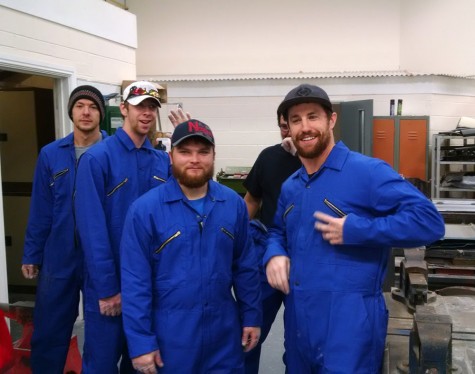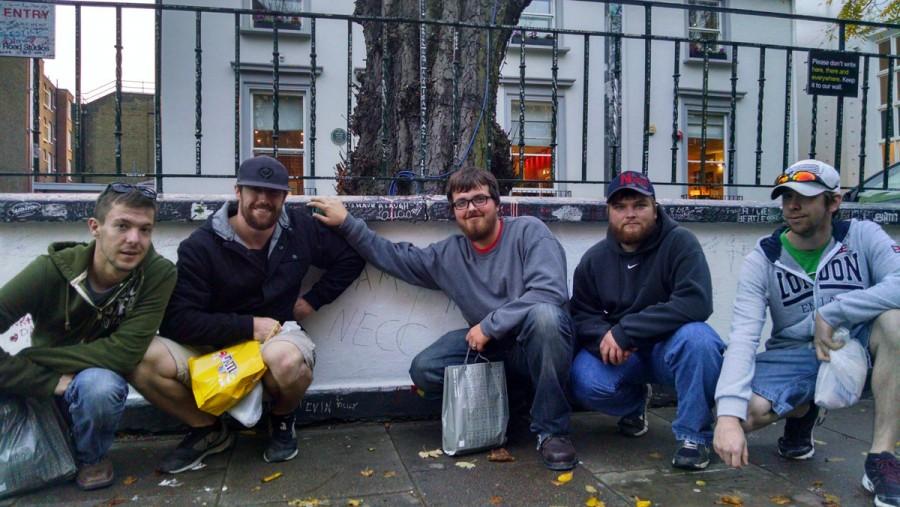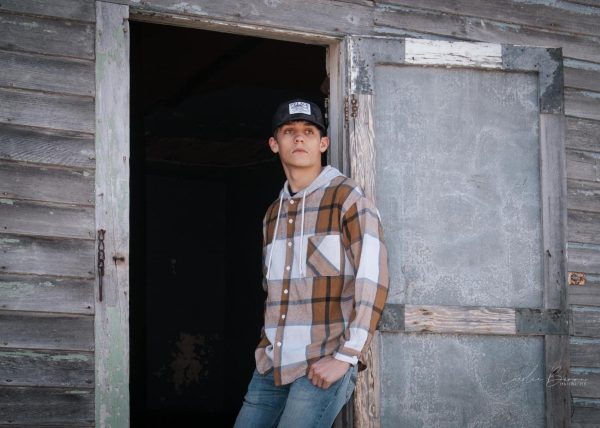Northeast Instructor And Students Gain A New Global Perspective Following Trip To England
Like thousands of others before them, Northeast Community College auto body students left a mark (NECC) on the wall outside Abbey Road Studios in London. The students were in England recently as part of an exchange with North Lindsey College in Scunthorpe. Pictured (from left) are Kyle Ebel, Scribner, Kellen Wells, Norfolk, Dustin Johansen, Friend, William Weiland, Decatur and Caleb Fowlkes, Meadow Grove. (Courtesy Dave Beaudette/Northeast Community College)
November 1, 2014
NORFOLK – Dave Beaudette said a recent trip “across the pond” has given him and five of his students at Northeast Community College a better understanding of themselves and the world in which they live. “I think each of us came home with a greater appreciation of our program, our college and our country.”
Beaudette, auto body instructor at Northeast, and the students traveled to North Lindsey College in Scunthorpe, England, for a ten-day visit from October 12-21, as part of a student and faculty exchange program established between the two colleges in 2012. Pam Saalfeld, associate dean of humanities, arts and social sciences at Northeast, accompanied the group.
The students making the trip included Kyle Ebel, Scribner, Caleb Fowlkes, Meadow Grove, Dustin Johansen, Friend, William Weiland, Decatur, and Kellen Wells, Norfolk.

Beaudette said North Lindsey’s auto body program compared favorably to Northeast’s. “They are in the process of building a new shop, but it will be much smaller than ours and they don’t do much collision work. We certainly came back with a greater appreciation for our shop and our auto body program in general,” he said. “Paint techniques are not much different with the exception of more water base coat. They still use some solvent base coats, but they label it industrial coating, so they are certainly not all water based considering that undercoats and clear coats are solvent.”
Beaudette said they spent time in the classroom and working in the auto body lab at North Lindsey, where the students were able to take time to work on panels and spray water base paint. He said he was proud of each student as they did very well with the work and conducted themselves in a professional manner.
Beaudette said, “It seems ‘panel beaters,’ as they call body men and painters, are in short supply across the country, both in auto and truck shops. Wages and benefits are comparable to here, but the government supplies health care.”
The group visited a large body shop chain that has 27 locations and 400 employees. Beaudette said they learned the company faced the same business challenges seen by many businesses in the United States, specifically larger material costs and 12 or more different insurance programs.
“Most cars are very small in England and almost all of them have manual transmissions while 85-percent of them are leased vehicles, so the shops also deal with many lease companies. The road tax in England is based on the fuel economy of each vehicle,” he said.
All of the students said one of the hardest adjustments to being in England was the size of cars, the steering wheel on the right side and driving on the opposite side of the road compared to here.
“You would walk up to a car to get in to the passenger side and it was actually the driver’s side,” Ebel said. “They have a lot of hatchbacks and small coupes that can navigate their small roads. Most of our cars would not make it through there.”
The students did get to experience driving in England, but it was not in the opposite lane. As part of a motorsports program, North Lindsey has set up a go-cart racing competition at a track in nearby Grimsby. Beaudette said it was a day of good natured, but serious competition of which his students fared very well.
The Northeast delegation also had the opportunity to tour MAN Truck and Bus, which offers a comprehensive range of commercial vehicles, buses, coaches and industrial engines to operators and companies in the United Kingdom. They also toured a factory museum for vehicle manufacturers Range Rover, Aston Martin and Jaguar.
Beaudette said in walking across campus, he and the students were struck by the age of the buildings, not only at North Lindsey, but across the English countryside.
“In this culture, it seems many of the buildings are 500-plus years old. All construction is brick, so it lasts for many, many years. We spent several days sightseeing Lincolnshire and sea ports in the region. The culture and the architecture were simple, but overwhelming to us. It is unbelievable to see what was built by hand many hundreds of years ago and is still in remarkable shape and is still used today,” he said. “Everything is extremely ornate and beautiful inside and out. It’s hard to believe it was built by hand. For example, it took 20-years to build Lincoln Cathedral and one wonders how many workers lost their lives in the process?”
Following their time in northern England, the group headed south to London. “Surprisingly, the countryside looked much the same as Nebraska, but the crops were wheat and sugar beets rather than corn and soybeans. There were very few fences in the fields, but instead, they would plant hedges,” Beaudette said. When it came to livestock, the Nebraskans saw more sheep and pen-raised deer rather than cattle.
As they entered one of the world’s largest cities, Beaudette said they were overwhelmed by the traffic on the “wrong side of the road” and the number of people who live there. “We mostly walked or rode the ‘Tube,’ the underground subway, which was a new experience that we all found pleasant and efficient.”
The group also toured many of London’s most well-known landmarks, the Tower of London, Westminster Abbey, Big Ben, London Bridge, Buckingham Palace and Abbey Road, where the students took a photo of themselves at the location made famous on the Beatles’ iconic album cover of the same name.
Beaudette said the whole trip was a great learning experience for the entire group. He said it was interesting to experience daily life in another culture. “The people were very nice and the staff at North Lindsey gave us a great reception and did an amazing job of planning things for us to do. Each day was full of new and exciting things! We spent evenings at various staff members’ homes, eating home cooked meals, visiting and learning about life in England. However, the food was much different there and the students were missing their McDonalds.”
The students gained a wide range of perspectives from the trip. Ebel said he felt the trip reassured him that he has chosen the right career path for him, while Wells said he came to realize that other than an accent, the English people are really no different from Americans.
Johansen, said, “I have a greater appreciation for what we do here. I thought going over there they would be more advanced in their techniques, but I’m really proud with what we have here too. It’s fairly similar.”
Leaving Nebraska was also eye-opening for them. Beaudette said, “Before our trip to England, none of us had traveled much – so that in itself was a great learning experience, but Pam took good care of us! The large airports were also a bit overwhelming, as were the crowds.”
Saalfeld, who also co-chairs Northeast’s global educational opportunities initiative, said this particular exchange with North Lindsey is special because it is geared toward students in programs who don’t normally have an opportunity to travel overseas. “This exchange focuses on applied technology and associate of applied science programs. It has been a real eye opening experience for the students as well as the faculty who have traveled. These students really make a connection, not only with the programs and the culture, but with each other. We have some students who made lifelong friendships as a result.”
Saalfeld said the exchange is part of Northeast’s efforts to internationalize its curriculum. “Our instructors are welcoming visiting scholars who come from different countries to teach. They are very willing to let these students have ten days out of their classroom here at Northeast to travel abroad because they know how important it is and how invaluable it is to bring these people in.”
Beaudette said he was very proud of his students on this exchange.
“Our students conducted themselves very well and represented Northeast Community College and the United States in a very positive way. As a group, we found that this trip of a lifetime truly expanded our horizons and exposed us to a completely different and much older culture than we could have imagined. I believe all of us learned a lot about ourselves during this exchange and the trip has given us a better global perspective.”









